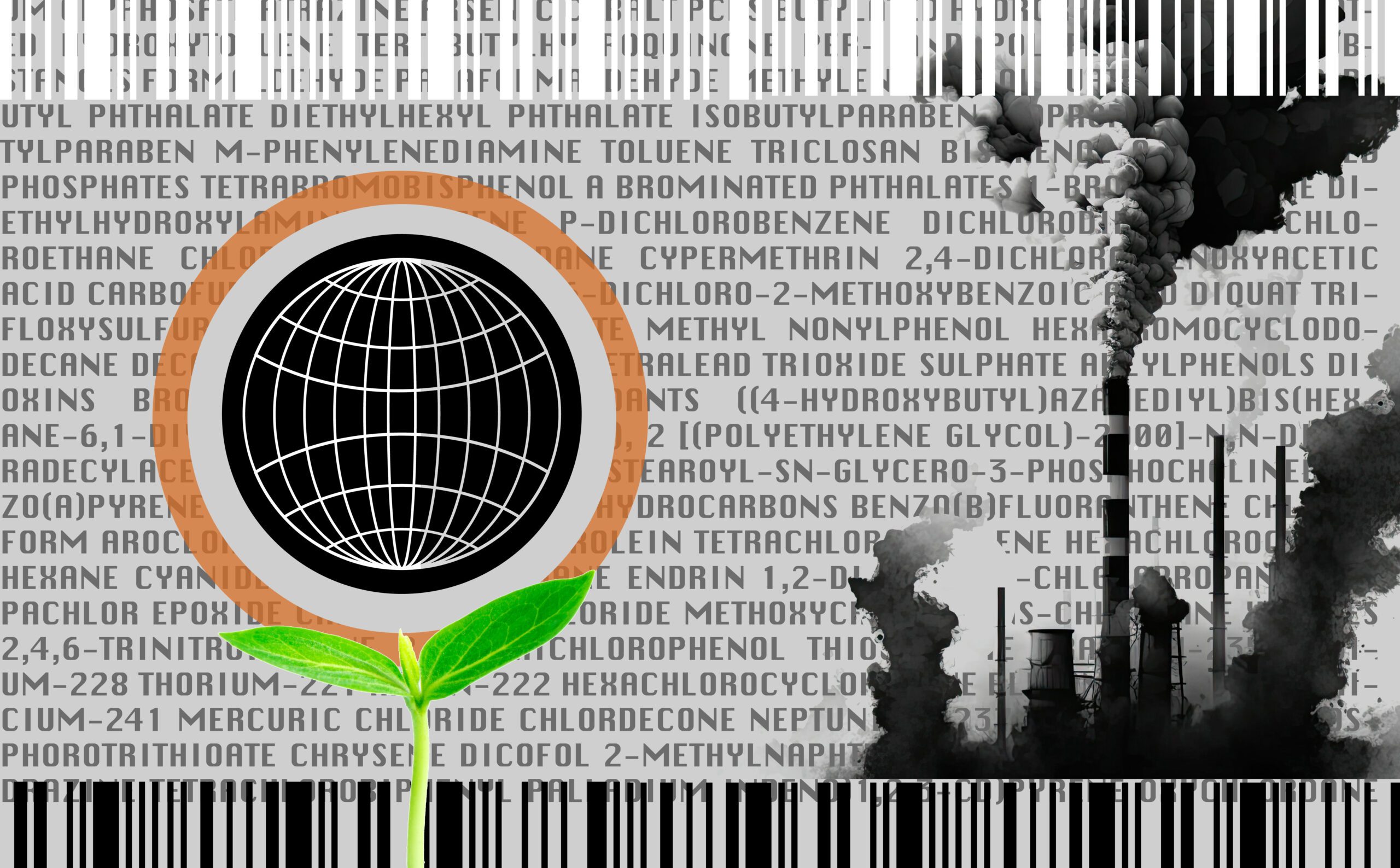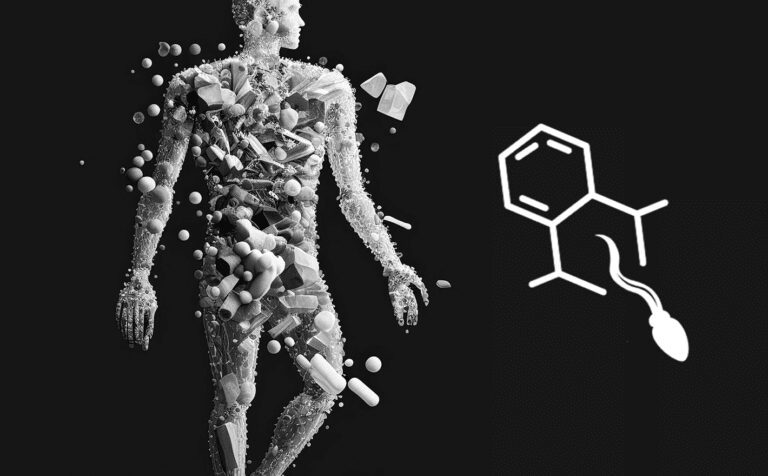Boy do modern humans love chemicals.
Of all the technologies that are pushing our collective mutation into a completely different kind of human–the Internet, Artificial Intelligence, smartphones, the shake weight–perhaps the most commonly overlooked is chemical engineering (especially considering that chemicals can literally cause genetic mutation).
Every year, the US introduces 2,000 brand-new molecules never before seen on Earth, most with minimal safety testing (if any). The quantity of synthetic molecules floating around in our environment is easily trillions of times higher than what people saw just a few generations ago.
It’s estimated that there are currently about 350,000 different human-made chemicals being used on a regular basis in body care products, drugs, pesticides, plastics, and dyes…not to mention the slew of industrial chemicals that we rely on to manufacture nearly everything we use.
But we need not live in fear. It’s all about education and awareness. When it comes to dealing with poisons, it really all boils down to two simple actions:
- Reduce your exposure
- Support your body’s natural ability to eliminate them
If you’re interested in action #2, then you absolutely need to know about glutathione.
What is Glutathione and What Are Its Benefits?
Produced mostly in your liver, glutathione is a natural molecule that your body makes to address a wide range of issues, especially toxins and free radicals. Called a ‘tripeptide’, glutathione is built from three common amino acids: glutamine, glycine, and cysteine (which is the main component of the famous detox and immune supplement called ‘NAC’).
Glutathione’s benefits and functions are extensive, including:
- Detoxification and liver function
- Healthy immune function
- Cellular energy production (mitochondrial function)
- Healthy mood and focus
- Free radical quenching (antioxidant)
- Healthy inflammation response
- Protection of DNA against mutation
Sound too good to be true? Actually, it’s not at all uncommon for a natural molecule to serve a large variety of different purposes.
For example, magnesium is necessary for hundreds of different chemical reactions and affects nearly every system in the body. Testosterone not only impacts fertility, but also mood, cognitive function, metabolism, strength, motivation, energy levels, and more (see our best-selling Male Vitality STAQ).
Much like magnesium and testosterone, glutathione is highly versatile and thus has wide-ranging effects on your health.
The Glutathione Pathway: How Glutathione Works To Eliminate Toxins, Protect Cells, and More
Biochemically speaking, detoxification has three phases:
- Phase 1 – Oxidation
- Phase 2 – Conjugation
- Phase 3 – Transportation
Each phase is equally critical, but Phase 2 is the step that many peoples’ bodies have the most trouble with…which just so happens to be where glutathione comes in.
Your liver is the ultimate transformer of chemicals. Think of it like a giant chemistry lab, with all the equipment it needs to drive different reactions and alchemically convert one thing to another.
In Phase 1 detoxification, various compounds are broken down into different substances, but sometimes these secondary substances can be even more toxic than their parent compounds. For example, Tylenol® (acetaminophen) is broken down, in a Phase 1 reaction, to a molecule called NAPQI that’s highly toxic to the liver.
As part of Phase 2, glutathione then comes in and binds to (conjugates with) NAPQI, neutralizing it so it can be safely eliminated. If our glutathione levels run low–however–which happens as we age, then our ability to neutralize poisons like NAPQI may be less than optimal.
Glutathione is so incredibly important that your body has an entire system of dozens of different enzymes dedicated to it.
The Glutathione Enzyme Family
If you read our blogs, then you know that we take toxins seriously. We don’t shy away from talking about how pesticides, plastics, and all the other nasty chemicals are sapping our vitality and preventing us from living up to our full potential.
That’s why we’ve done a massive amount of research into the whole family of glutathione enzymes and which nutrients and herbs can boost them. All that information eventually culminated in the creation of our premiere daily detox supplement, APEX Glutathione.
Read on to explore how these enzymes work and how to boost them.
Need a quick refresher on what an enzyme is? Simply put, an enzyme is any substance that acts as a catalyst to facilitate a chemical reaction. Your body contains countless enzymes that are all necessary for normal functionality.
Glutathione S-Transferases (GST): Eliminating Toxins and Preventing Collateral Damage From Your Immune System
These enzymes do exactly what they sound like. They attach glutathione molecules to stuff. This of course includes toxins that the body wants to eliminate, but they do much more than that.
GST enzymes are also important when it comes to protecting your cells from free radical damage. Think of glutathione as a kind of armor, and GST enzymes as engineers who come around and attach it to your cells to protect them.
Our immune system actually uses free radicals like weapons in the fight to destroy invaders. Two types of immune cells, called macrophages and neutrophils, use highly tissue-destructive compounds like hydrogen peroxide and the superoxide anion to degrade microorganisms.
In a nutshell, glutathione prevents collateral damage from accidental friendly fire when your immune system is going after the bad guys.
The ingredients in APEX Glutathione that support GST enzymes include:
- Bacopa monnieri
- Ginkgo biloba
- Milk thistle
- R-Alpha Lipoic Acid
Glutathione Peroxidases (GPx): Helping Glutathione Neutralize Free Radicals and Boost Energy Production
Simply put, glutathione peroxidase enzymes help glutathione quench free radicals, rendering them inert.
Also called ROS (Reactive Oxygen Species), free radicals are molecules that cause the destruction of tissues by stealing electrons from them. This process is what’s meant by the terms oxidative damage and oxidative stress.
They’re particularly bad for us because of their ability to damage our DNA, which is why antioxidants help to counteract genetic mutation.
Free radicals can come from a wide variety of sources, not just toxins like pesticides and heavy metals.
Our bodies regularly make them as a natural part of the metabolic process. Think of them as like the toxic exhaust from your car, something that you definitely would not want building up inside the engine or–God forbid–the interior.
Your mitochondria spit out a huge quantity of free radicals when they’re producing energy. That’s why antioxidants like glutathione and CoQ10 are essential to mitochondrial function.
Glutathione peroxidases are named in part because they help glutathione neutralize hydrogen peroxide. As we saw in the previous section on GST enzymes, the immune system uses peroxides as weapons against invaders, and so the GPx family of enzymes is also necessary to protect our bodies from this collateral damage.
The ingredients in APEX Glutathione that support GPx enzymes include:
- Bacopa monnieri
- Jiaogulan (Gynostemma pentaphyllum)
- R-Alpha Lipoic Acid
- Selenium glycinate
Glutathione Reductase (GR): the Recharger of the Glutathione System
Biochemistry is fascinating. Molecules can transform back and forth between two different forms thousands of times. The prime example of this is a process called redox.
There are two main forms of glutathione, the reduced form and the oxidized form. In chemistry, the term reduced means that a molecule has gained electrons (because they have a negative charge, so adding an electron means reducing the charge).
Oxidized means that something has lost electrons. This is what we mean when we’re talking about oxidative damage.
Because glutathione is an antioxidant, that means it’s an electron donor…but what happens when it loses all its electrons in the process of neutralizing all the oxidizing free radicals?
That’s where glutathione reductase comes in. Think of it like a battery charger.
Imagine that each glutathione molecule is like a Tesla. Just like an electric car, each one can only go so long without recharging.
Thus, glutathione has to occasionally pull over and plug itself into a glutathione reductase charging station to fill up its tank of electrons before getting back out there and continuing its job of protecting our cells.
The ingredients in APEX Glutathione that support the GR enzyme include:
- Jiaogulan (Gynostemma pentaphyllum)
- R-Alpha Lipoic Acid
- Vitamin B2 (as Riboflavin-5’-Phosphate)
The Ultimate Tool to Support Your Glutathione System
As mentioned, APEX was designed only after doing a deep dive into all of the biochemistry we just talked about.
Not only does it contain a wide range of nutrients and herbs that support the various enzymes that run the glutathione system, but it also contains:
- High absorption liposomal glutathione
- NAC, the most essential building block of glutathione
- B vitamins that drive the synthesis of both glutathione and its precursors in the body
In addition to all that, APEX is a fantastic supplement just for healthy mood and focus. Glutathione is known to have these properties, but herbs like Ginkgo, Bacopa, and Jiaogulan really take this supplement to the next level.
If you’re looking for the most comprehensive glutathione support product on the market–that also happens to be a great nootropic and mood booster–then look no further.
And if you’d like to educate yourself a bit more about a few of the 350,000 reasons to take your detox game to the next level, check out a few of these blogs:





